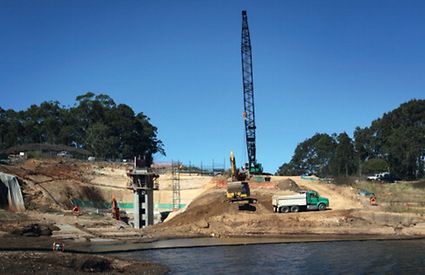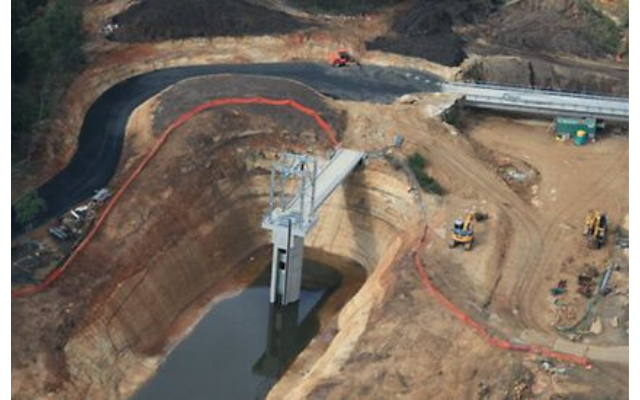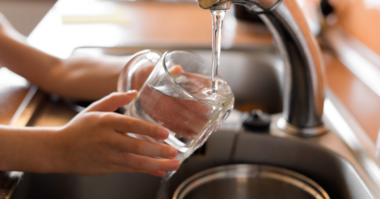In order to secure the water supply and protect the health of rivers, creeks and the environment Gosford City and Wyong Shire Councils have implemented a long term strategy known as WaterPlan 2050. This strategy is being realized through increasing the dam capacity of existing dams and extending the pipeline infrastructure to provide more effective water transportation.
Water transfer station pumps water from the Mardi Dam to the nearby treatment works and high lift station pumps water from the treatment works into the distribution network and associated pipeworks.
The project: Upgrading the Mardi Dam
The New South Wales (NSW) central coast water supply system has undergone many improvements over its long lifetime, none more so than in recent decades when improvement works have been almost continuous in response to population growth, changes in government regulations, varying climate conditions and new technologies.
One of the largest projects to have been undertaken has been the Australian $45 million Mardi Dam Upgrade.
Having a capacity of 7.6 billion litres, the Mardi Dam is an off-river storage dam located near the Wyong River. The water transfer station pumps water from the dam to the nearby treatment works and the high lift pump station pumps water from the treatment works into the distribution network and associated pipeworks.
Together with the construction of two tunnels, one 144m long with a diameter of 1.8m and the other 60m long with a diameter of 1.5m, plus 250m of large diameter pipework and associated valves the two pump stations have increased transfer capacity from 100 million litres a day to 160 million litres of treated water a day.
The client: Baulderstone
Baulderstone started over eighty years ago has a rich heritage and strong relationships. Baulderstone is one of the largest building and engineering companies in Australia, with over 1400 people across the country. Engineering contractors for the project, Baulderstone specified KSB Australia on the basis that they had previously worked together on the construction of the Nepean Dam Pumping Stationing (NSW), supplying three 400-635 RDLO pumps with 1300Kw 4-pole TECO motors.
The challenge: Supplying pumps for the transfer pumping station and high lift pumping station with high standards
KSB Australia started preliminary work on the Mardi Dam project in 2009, making recommendations in response to the specifications laid out by the various contractors tendering for the job. The project team prepared considerable in-depth documentation for all the contractors so that they all had the same presentation information for their customer, the Wyong and Gosford Councils.
The Mardi Dam incorporates water transfer and high lift pump systems both of which have been equipped with KSB’s RDLO pumps.
Supply and install
- three RDLO 600-600Aw pumps with 250kW motors
- three RDLO 500-860Bw pumps with 1300kW motors for the high lift station.
- advice on energy-efficient pumping

KSB RDLO pumps have been installed in both the transfer and high lift pumping stations. (Photo: Courtesy of Baulderstone).
The solution: RDLO pumps for reliable and efficient operation
The new transfer system between the dam and the Mardi Water Treatment Plant (MWTP) is capable of delivering 240ml/day and allows for a possible future off-take to the Mangrove Creel Dam. The high lift pumping station is adjacent to the MWTP site and is capable of delivering up to 240ml/day from the MWTP to the existing Tuggerah No.2 Reservoir and the Wyong distribution system.
For both the transfer pumping station and the high lift pump station all the pumps are in a two duty one standby configuration and each has a differential head of 18m and a capacity of 1010l/c. Whilst both pump stations can readily accommodate all current requirements, WaterPlan 2050 made provision for each station to accommodate a fourth pump bringing the capacity up to 250 million litres a day.
Specified for the project by engineering contractors Baulderstone, KSB’s RDLO axially split, single stage volute pumps have been developed specifically for handling raw water, clean water, service water and transport fluids with a minimum of flow resistance. As a result, they lower the energy and life cycle costs of the systems in which they are installed. They also meet the twin demands of reliability and high availability.
Reliability results from the casing halves being sealed by solid casing split flanges at the upper and lower casing part, and high availability is attributable to the use of generously dimensioned bearings and high-quality shaft seals. Smooth running is ensured at all times thanks to the flow-optimized, vortex-free intake elbow and rigid shaft with short bearing span. Because the shaft is completely sealed without steps/threads in the wetted area the RDLO offers reliable power transmission.
“The Australian water industry is looking for reliability from its pump suppliers and sets very high standards,” comments Mauricio Cle, National Manager-Water, KSB Australia Pty Limited. “Every water utility has its own specification, but in our experience we find that many specification documents are quite similar and although we try and comply as much as possible with the specification given to us, it is not always possible to do so. Where we are unable to comply, we will recommend an alternative solution that sets out very clearly what we have to offer and where the differences lie. In fact, this is often very positive for us and an advantage for the customer, as it allows us to introduce new ideas and technologies especially where the specification may reflect older thinking and design concepts.”
One example which is frequently encountered by KSB is where the specification for split casing pumps calls for studs on the flanges in order to align the top case to the bottom case. The KSB RDLO pump design does not require the presence of flange studs because the top case and lower case are self-aligning. Therefore all that is required are normal bolts, making installation and maintenance are much quicker and easier, and of course, there are no studs to get damaged.
“We also have a strong capability in offering advice in operating efficiency,” continues Mauricio Cle. “For instance, when we are reviewing the customer’s specification we always study the application to evaluate how this influences pump efficiency. With the assistance of our hydraulics department in Germany, we can recommend how optimum efficiency can be achieved both at low and high operating speeds. By adopting this approach, the customer is not basing their purchasing decision simply on what levels of efficiency they hope to achieve. Even a 1% increase in efficiency can contribute to substantial savings over the long term, particularly where several pumps are involved.”
The Mardi Dam Project has made the central coast water supply system far more flexible by improving the rate at which water can be transferred between the Wyong and Gosford water supply systems. For KSB Australia, it has been another opportunity to demonstrate the Company’s considerable pump engineering capabilities in the water supply sector.

The transfer pumping station has been equipped with three RDLO 600-600Aw pumps with 250 kW motors and the high lift station with three RDLO 500-860Bw pumps with 1300 kW motors. (Photo: Courtesy of Baulderstone)
New South Wales $45 million Mardi Dam Upgrade program gives KSB the chance to demonstrate its pump engineering skills.
“The Australian water industry is looking for reliability from its pump suppliers and sets very high standards,” comments Mauricio Cle, National Manager-Water, KSB Australia Pty Limited.
Data I Facts I Figures
| Location | The Mardi Dam is adjacent to the Wyong River in News South Wales, Australia |
|---|---|
| Client | Baulderstone Hornibrook International Pty Ltd |
| Area of application | Water supply |
| Scope of supply |
Together, the two pump stations have increased transfer capacity from 100 million litres a day to 160 million litres of treated water a day. |




